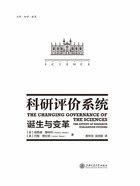
五、结论
本章讨论了几点关于在公共科学系统中建立科研评价体系的发展和影响,可总结为以下三个主要的结论。第一,这样的回溯性评估体系具有高度的多样性,因为不管国家与科学关系的制度创新的制度化以及在不同学术系统中的变化如何,还是它们对科研方向和组织的影响,都反映了不同国家不同的公共科学系统的组织方式,也反映了该国专业劳动市场的总体结构及某些特征。在不同类型的国家系统中,不同组织的政治家、精英公职人员、商界精英及其他有影响力的政策顾问以不同的方式建立了不同的科研评价体系,这些体系的作用又受到国家学术系统的各种特征的影响,本书中关于澳大利亚、德国、荷兰、西班牙和瑞典的部分会说明这一点。
因此,正如本书的多个章节所提到的,尽管在科研评价体系的某些方面上,经合组织的成员国已经有互相模仿和借鉴的情况,有时候借鉴的程度还非常大,但实际的实施受到了国家间差别的影响,包括国家机构是如何对科研和高等教育进行资金拨款的、科学精英内部是如何组织的、他们是如何处理与政客和国家部门的关系的、以及研究人员的聘用方式与职业发展情况。
第二,影响科研评价体系在公共科学中的发展与作用的一个重要因素是,在很多引入了评价体系的社会系统中,大学及其他科研机构本质和行为的改变。这些大学和机构如何应对和影响不同类型的评价的实施,对科学家的职业生涯、专业劳动力市场以及研究团体和领域的组织和方向,都有重大的影响。由于很多科研评价体系已经成为分配部分财政和管理权力以及资源到大学和其他机构过程的一部分,它们已经成为更加重要的集体化主体,以发展和组织科学知识,更深程度地协调国家政策(如对科研评价体系的引入)的影响。
尽管这种财政和管理权分散的程度在欧洲及其他地方的不同国家有很大不同,而且在有的地方这种权力下放是表面多于实际,它还是在不同程度上促进了资源控制和战略自主权从国家到研究机构的转变,因此,不同的管理者和研究人员如何利用这种自主权,比他们只是执行国家部门的决定更加重要,特别当他们能够提出一套更加独立的研究政策,而不只是复制研究评价制度的同行评审及项目审议的结果时。
随着大学和其他科研机构的独立性加强并且能够掌控自己的资源,它们作为独立的人员聘请机构如何发展不同的研究管理能力对公共科学的组织和发展越发重要。尽管大学和其他科研机构不太可能通过权力关系和管理等级像市场经济的私企一样通过资源基础理论发展出如此特征鲜明的组织能力(Metcalfe and James,2000;Penrose,1959:Whitley,2003b),但是,在许多国家,科研评价体系和管理权的下放,使得大学和其他科研机构的管理和行为对科学研究的影响比以前更为重要。然而,在欧洲大陆和日本,很多大学和科研机构实际的自主权和战略能力目前来看似乎还是十分有限。
第三,尽管采用强式科研评价体系对科学领域会产生一些普遍性的影响,特别是当这些评价体系是围绕着稳固的学科分界和学科精英建立的时候,但是,这些评价体系在不同的科学领域的实际影响会大有不同,而且这种影响常常会跟国家公共科学系统的特征互相作用。在一个国家中,不管施行何种评价体系,又对这种体系作何种改变,都会对其中某些科学领域和研究形式更为有利,对其中的某些领域的改变程度更大。
由于科学领域有各种各样的不同,并且随着时间的流逝,一些领域会突显出来,逐渐在或隐性或显性的科学声望等级中成为主导,因此,任何企图使评判科研效率与质量的方式标准化的评价体系都一定会对不同的科学领域有不同的影响。正如本章已经说到的那样,这是否会最终促进研究范式、出版方式及科研工作组织的标准化,取决于每个国家科研评价体系的本质、重要性以及实施方式,也取决于公共科学系统的本质和主要的大学和科研机构的行为。
参考文献
Becher,Tony and Paul Trowler (2001),Academic Tribes and Territories:Intellectual enquiry and the culture of disciplines,Buckingham:Open University Press and the Society for Research into Higher Education.Second edition.
Block,Hans-Juergen (1990),‘The University Systems in Transition:Possibilities and limitations of universities in the ‘steady state’,in Susan E.Cozzens,Peter Healey,Arie Rip and John Ziman (eds.),The Research System in Transition,Dordrecht:Kluwer,pp.35-50.
Braun,Dietmar (1998),‘The Role of Funding Agencies in the Cognitive Development of Science’,Research Policy,27,807-821.
Braun,Dietmar (2003),‘Lasting Tensions in research Policy-Making-A delegation problem’,Science and Public Policy,30,309-321.
Brooks,Harvey (1990),‘Lessons of History:Successive challenges to science policy’,in Susan E.Cozzens,Peter Healey,Arie Rip and John Ziman (eds.),The Research System in Transition,Dordrecht:Kluwer,pp.11-22.
Campbell,David F.J.(2003),‘The Evaluation of University Research in the United Kingdom and the Netherlands,Germany and Austria’,in Philip Shapira and Stefan Kuhlmann (eds.),Learning from Science and Technology Policy Evaluation.Experiences from the United States and Europe,Cheltenham:Edward Elgar,pp.98-131.
Casper,Steven (2000),‘Institutional Adaptiveness,Technology Policy and the Diffusion of New Business Models:The Case of German Biotechnology’,Organization Studies,2,887-914.
Casper,Steven (2006),‘How Do Technology Clusters Emerge and Become Sustainable? Social network formation and inter-firm mobility within the San Diego biotechnology cluster’,Working Paper:Keck Graduate Institute of Applied Life Sciences.
Casper,Steven and Richard Whitley (2004),‘Managing Competences in Entrepreneurial Technology Firms:A comparative institutional analysis of Germany,Sweden and the UK’,Research Policy,33,89-106.
Clark,Burton R.(1995),Places of Inquiry:Research and advanced education in modern universities,Berkeley:University of California Press.
Coleman,Samuel (1999),Japanese Science:View from the inside,London:Routledge.
Cozzens,Susan E.(1990),‘Options for the Future of Research Evaluation’,in Susan E.Cozzens,Peter Healey,Arie Rip and John Ziman (eds.),The Research System in Transition,Dordrecht:Kluwer,pp.281-294.
Dasgupta,Partha and Paul A.David (1994),‘Toward a New Economics of Science’,Research Policy,23,487-521.
Drori,Gili S.,John W.Meyer,Francisco O.Ramirez and Evan Schofer (2003),Science in the Modern World Polity:Institutionalization and globalization,Stanford:Stanford University Press.
Freeman,Christopher and Luc Soete (1997),The Economics of Industrial Innovation,London:Pinter.
Gaughan,Monica and Stephane Robin (2004),‘National Science Training Policy and Early Scientific Careers in France and the United States’,Research Policy,33,569-581.
Hallam,A.(1973),A Revolution in the Earth Sciences:From continental drift to plate tectonics,Oxford:Oxford University Press.
Hansen,Hanne Foss and Finn Borum (1999),‘The Construction and Standardization of Evaluation:The case of the Danish university sector’.Evaluation,5,303-329.
Kenney,Martin (ed.)(2000),Understanding Silicon Valley:The anatomy of an entrepreneurial region,Stanford:Stanford University Press.
Langfeldt,Liv (2001),‘The Decision-Making Constraints and Processes of Grant Peer Review,and Their Effects on the Review Outcome’.Social Studies of Science,31,820-841.
Liefner,Ingo (2003),‘Funding,Resources Allocation,and Performance in Higher Education Systems’,Higher Education,46,469-489.
Marginson,Simon and Mark Considine (2000),The Enterprise University:Power,governance and reinvention in Australia,Cambridge:Cambridge University Press.
Martin,Ben (2003),‘The Changing Social Contract for Science and the Evolution of the University’,in Aldo Geuna,Ammon J.Salter and W.Edward Steinmuller (eds.),Science and Innovation:Rethinking the rationales for funding and governance,Cheltenham:Edward Elgar,pp.7-29.
Martin,Ben and Aldo Geuna (2003),‘University Research Evaluation and Funding:An international comparison’.Minerva,41,277-304.
Metcalfe,J.Stanley and Andrew James (2000),‘Knowledge and Capabilities:A new view of the firm’,in Nicolai Foss and Paul Robertson (eds.),Resources,Technology and Strategy:Explorations in the resource based perspective,London:Routledge,pp.31-52.
Mowery,David C.(1999),‘The Computer Software Industry’,in David C.Mowery and Richard R.Nelson (eds.),Sources of Industrial Leadership,Cambridge:Cambridge University Press,pp.133-168.
Mowery,David C.,Richard R.Nelson,Bhaven N.Sampat and Arvids A.Ziedonis (2004),Ivory Tower and Industrial Innovation:University-Industry technology transfer before and after the Bayh-Dole Act,Stanford,California:Stanford University Press.
Muller-Camen,Michael and Stefan Salzgeber (2005),‘Changes in Academic Work and the Chair Regime:The case of German business administration academics’,Organization Studies,26,271-290.
Penrose,Edith (1959),The Theory of the Growth of the Firm,Oxford:Blackwell.
Pfeffer,Jeffrey (1993),‘Barriers to the Advance of Organization Science’.Academy of Management Review,18,599-620.
Ruivo,Beatriz (1994),‘‘Phases’ or ‘Paradigms’ of Science Policy?’,Science and Public Policy,21,157-164.
Sienko,Tanya (1997),A Comparison of Japanese and U.S.Graduate Programs in Science and Engineering,Tokyo:National Institute of Science and Technology Policy,Discussion Paper no.3.
Stokes,Donald E.(1997),Pasteur's Quadrant:Basic science and technological innovation,Washington,D.C:Brookings Institution Press.
Tabil,Ameen Ali (2001),‘The Continued Behavioural Modification of Academics since the 1992 Research Assessment Exercise’,Higher Education Review,33,30-46.
Van der Meulen,Barend and Loet Leydesdorff (1991),‘Has the Study of Philosophy and Dutch Universities Changed under Economic and Political Pressure?’,Science,Technology,and Human Values,16,288-321.
Whitley,Richard (2000),The Intellectual and Social Organization of the Sciences,Oxford University Press.Second edition.
Whitley,Richard (2003a),‘Competition and Pluralism in the Public Sciences:The impact of institutional frameworks on the organisation of academic science’,Research Policy,32,1015-1029.
Whitley,Richard (2003b),‘The Institutional Structuring of Organisational Capabilities:The role of authority sharing and organisational careers’,Organization Studies,24,667-695.